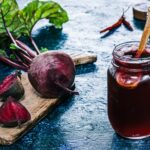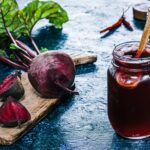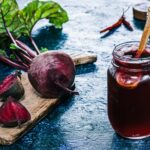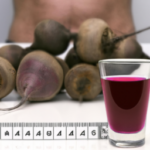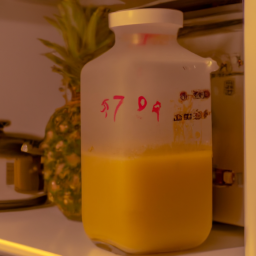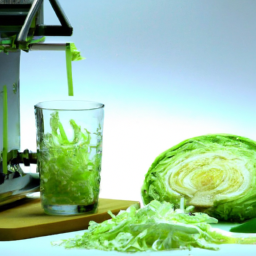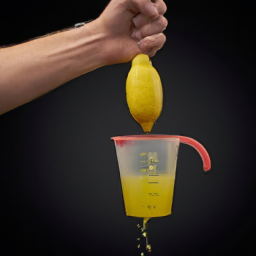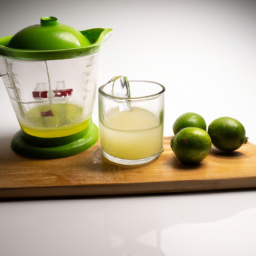Drinking beetroot juice can greatly improve your overall health, fitness, and well-being. This vibrant juice is packed with essential nutrients, antioxidants, and anti-inflammatory compounds that can help lower blood pressure, boost endurance, and enhance cognitive function. Making beetroot juice a regular part of your diet is a simple and effective way to take care of your body. But where can you find this amazing drink?
Let me tell you, the search for beetroot juice can be a daunting task. However, fear not! There are plenty of options available, and I’m here to guide you through them. Whether you prefer to shop at your local grocery store, health food store, or online retailer, I’ve got you covered.
In this article, I will provide you with a comprehensive guide on where to buy beetroot juice, tips on how to choose the best quality product, and even show you how to make your own beetroot juice at home. So, let’s get started!
Key Takeaways
- Beetroot juice can be purchased at local grocery stores, health food stores, and online retailers.
- Quality should be prioritized over price when buying beetroot juice, with freshness, ingredients, and packaging being important factors to consider.
- Natural sweeteners should be used instead of artificial flavors or sugars in beetroot juice, and sustainable packaging is also important.
- Consultation with a healthcare professional is recommended before consuming beetroot juice, as it can cause side effects if consumed in excess.
Benefits of Drinking Beetroot Juice
You’ll be amazed at how drinking beetroot juice can improve your athletic performance and lower your blood pressure. Beetroot juice is packed with essential vitamins and minerals that can benefit your overall health. It contains high levels of vitamin C, iron, potassium, and magnesium, which can help improve your immune system, muscle function, and energy levels.
Not only that, but beetroot juice is also known for its potential to lower blood pressure. It contains nitrates that can help dilate blood vessels, which can result in better blood flow and lower blood pressure.
However, despite its numerous benefits, drinking too much beetroot juice can cause potential side effects, such as kidney stones, stomach upset, and diarrhea. It’s important to consume beetroot juice in moderation and consult with a healthcare professional before adding it to your diet.
With that in mind, let’s now move on to where you can find beetroot juice in grocery stores.
Grocery Stores
In the aisles of your local grocery store, you can often find a variety of fresh produce and pantry staples. If you’re in the market for beetroot juice, you’ll likely find a few different options in the refrigerated juice section.
Some grocery stores carry their own store-brand beetroot juice, while others stock popular brand names. When considering your grocery options, it’s worth doing a pricing comparison. In my experience, prices for beetroot juice can vary quite a bit from store to store.
Some stores offer competitive prices, while others charge a premium. Keep an eye out for sales and promotions, as well as bulk purchase options, which can help you save money in the long run. With that said, if you’re looking for a wider variety of beetroot juice brands and formulations, you may want to consider checking out health food stores.
Health Food Stores
Health food stores are a popular destination for people who want to adopt a healthier lifestyle. Over 38% of Americans report that they regularly shop at these types of stores. When it comes to beetroot juice, health food stores are a great option for finding local availability of popular brands. Here are some reasons why health food stores are a great place to buy beetroot juice:
-
Freshness: Health food stores often carry fresh and organic produce, which means that the beetroot juice will be of higher quality and freshness.
-
Knowledgeable staff: The staff at health food stores are often well-informed about the products they carry and can provide guidance about the best brands and products to suit your needs.
-
Variety: Health food stores often carry a wide variety of beetroot juice brands and products. This means that you can find the perfect product to suit your taste and preferences.
-
Support local businesses: By shopping at health food stores, you can support local businesses and farmers who produce beetroot juice.
If you’re looking for beetroot juice, health food stores are a great option to consider. However, if you can’t find what you’re looking for locally, don’t worry! There are many online retailers that offer a wide selection of beetroot juice products.
Online Retailers
With the rise of online shopping, it’s easier than ever to find a wide selection of healthy and organic products, including some of the most popular beetroot juice brands. When searching for beetroot juice online, it’s important to consider shipping options as well as customer reviews.
Some websites offer free shipping on orders over a certain amount, while others may have faster shipping options for an additional fee. Reading through customer reviews can also give insight into the quality of the product and the reliability of the website.
One popular online retailer for health and wellness products is Amazon. They offer a variety of beetroot juice brands with different shipping options, including free two-day shipping for Prime members. Additionally, the customer reviews on Amazon can be very helpful in determining which brand to choose.
Other online retailers such as Thrive Market and Vitacost also offer a great selection of beetroot juice brands with competitive pricing and reliable shipping options. When choosing the best quality product, it’s important to consider factors such as the ingredients, manufacturing process, and nutritional value.
By doing a little research and reading through customer reviews, you can find the perfect beetroot juice to fit your needs and preferences.
Choosing the Best Quality Product
When it comes to buying beetroot juice, I always prioritize quality over price.
For me, the three key factors that determine the quality of the product are freshness, ingredients, and packaging.
Freshness is key to getting the most out of the nutrients in beetroot, while the ingredients should be natural and free from any harmful additives.
Finally, the packaging should be sturdy, leak-proof, and able to preserve the freshness of the juice for as long as possible.
Freshness
To ensure optimal flavor, it’s important to purchase beetroot juice that’s freshly made and hasn’t been sitting on the shelf for too long. The freshness of the juice can greatly affect its taste and nutritional value.
Here are a few things to consider:
- Look for beetroot juice that’s made and bottled locally. This ensures that the juice hasn’t traveled far and has been made recently.
- Check the expiration date on the bottle. While fresh juice may have a shorter shelf life, it’s important to make sure that the juice hasn’t expired before purchasing it.
- Consider purchasing beetroot juice from a store that specializes in fresh, organic produce. These stores often have a higher turnover rate for their products, meaning that the juice is more likely to be freshly made.
When it comes to getting the most out of beetroot juice benefits, fresh juice is the way to go. And by following these storage tips and purchasing guidelines, you can ensure that you’re getting the freshest and most nutritious juice available.
Moving on to the next section, let’s take a look at the importance of ingredients in beetroot juice.
Ingredients
The key constituents of a good beet drink are the ingredients. Beetroot juice recipes can vary depending on the additional ingredients used, but the star of the show is always the beetroot. Beets are packed with essential vitamins and minerals such as vitamin C, potassium, iron, and folate. Drinking beet juice can help improve blood pressure, boost stamina, and even help with digestion.
Aside from the nutritional value of beets, it’s important to consider the quality of the other ingredients in your beet drink. Look for products that use natural sweeteners like honey or fruit juice instead of artificial flavors or sugars. A good beet drink should be a healthy and delicious addition to your diet, so choosing high-quality ingredients is key.
Moving onto the next section about ‘packaging’, it’s important to keep in mind that the packaging also plays a role in the overall quality of the product.
Packaging
Consider the impact that the packaging of your beet drink has on the environment and choose brands that prioritize sustainability. Sustainable packaging is becoming increasingly important, as our planet is facing a growing waste crisis.
When purchasing beetroot juice, it’s important to look for eco-friendly options that use materials that are recyclable, biodegradable, or compostable. Some companies have already started to prioritize sustainable packaging. For instance, some brands use glass bottles, which are a great option as they can be recycled infinitely without losing their quality. Others use biodegradable packaging materials such as plant-based plastics, which are made from renewable sources and can break down naturally over time.
By choosing brands that prioritize sustainable packaging, we can reduce the amount of waste we produce and help preserve the environment for future generations.
When it comes to choosing between organic and non-organic beetroot juice, there are many factors to consider.
Organic vs. Non-Organic
When it comes to choosing beetroot juice, one of the key decisions to make is whether to go for organic or non-organic. As someone who’s concerned about the quality and benefits of the juice I consume, I’m interested in exploring the advantages of going organic.
While it’s true that organic options may come at a higher cost, I’m willing to weigh this against the potential benefits for my health and the environment.
Benefits of Organic Beetroot Juice
Organic beetroot juice is a great way to get a boost of nutrients and antioxidants, and it’s worth the extra cost for the health benefits. When it comes to nutritional content, organic beetroot juice has higher levels of vitamins and minerals compared to its non-organic counterpart. This is because organic farming methods prohibit the use of synthetic fertilizers and pesticides that can strip the soil of its nutrients.
As a result, organic beetroot juice has a richer and more complex flavor profile that’s not only healthy but also delicious. Moreover, organic beetroot juice is better for the environment. Organic farming practices promote sustainability and help protect the soil, water, and air from harmful chemicals.
By choosing organic beetroot juice, you’re not only taking care of your body but also supporting a sustainable food system. While organic beetroot juice may cost a bit more than non-organic options, the added health benefits and environmental advantages make it worth the extra expense.
In the next section, we’ll delve into a cost comparison of organic and non-organic beetroot juice.
Cost Comparison
You might be surprised to find that the cost difference between organic and non-organic options isn’t as significant as you may think. In fact, many online retailers offer deals and discounts on both types of beetroot juice.
When comparing prices, keep in mind that organic options tend to be slightly more expensive than non-organic options, but the price range is generally within a few dollars.
When shopping for beetroot juice, it’s important to consider shipping options and delivery time. Some online retailers offer free shipping, while others charge a fee. Additionally, delivery time can vary depending on the retailer and your location. Be sure to read reviews and check the retailer’s shipping and return policies before making a purchase.
Moving onto the subsequent section about different types of beetroot juice, it’s important to consider the quality and nutritional value of each option.
Different Types of Beetroot Juice
There’s no denying that beetroot juice is a powerhouse of nutrients, but did you know that there are different types of beetroot juice, each with its own unique benefits and flavor profiles? It’s like having a toolbox full of different tools, each one serving a different purpose. To help you choose the best beetroot juice for your needs, I’ve created a table that outlines the different types of beetroot juice, their flavor profiles, and their nutritional value.
| Type of Beetroot Juice | Flavor Profile | Nutritional Value |
|---|---|---|
| Raw Beetroot Juice | Earthy, slightly bitter | High in nitrates, iron, and vitamin C |
| Cooked Beetroot Juice | Sweet, mellow | High in antioxidants and betaine |
| Fermented Beetroot Juice | Tangy, slightly sour | High in probiotics and enzymes |
Each type of beetroot juice has something unique to offer, so it’s important to choose the one that best suits your taste and nutritional needs. Now that you know the different types of beetroot juice available, let’s move on to the next section where we’ll explore the best brands of beetroot juice on the market.
Best Brands of Beetroot Juice
If you’re a health enthusiast looking for a tasty and convenient way to incorporate more superfoods into your diet, look no further than these top-rated brands of beetroot juice.
First on the list is Biotta, which is known for its organic and non-GMO beet juice. It has a sweet and earthy flavor that’s easy to drink on its own or mixed with other juices. Biotta also has a high nutritional content, containing vitamins B and C, potassium, and iron.
Another popular brand of beetroot juice is Lakewood Organic, which offers several different flavor preferences. Their beet juice is made from 3 lbs of beets in every bottle, making it one of the most concentrated on the market. It’s also USDA certified organic and non-GMO, ensuring that you’re getting the highest quality juice. With its slightly tart taste, Lakewood Organic’s beet juice is perfect for those who prefer a more tangy flavor profile.
If you’re looking to save some money and make your own beetroot juice at home, it’s actually very easy to do. All you need is a juicer and some fresh beets. Simply wash and peel the beets, cut them into small pieces, and run them through the juicer. You can also add other fruits and vegetables to create your own unique juice blends.
With these top-rated brands and easy home juicing options, incorporating beetroot into your diet has never been easier!
Making Beetroot Juice at Home
I love making my own beetroot juice at home! It’s easy and a great way to control the ingredients and taste. All you need is a juicer or blender, some fresh beets, and maybe a few other ingredients for flavor.
I’ll share my favorite recipes and equipment recommendations to help you get started on making your own delicious beetroot juice!
Recipes
You’ll love the delicious taste of beetroot juice in these easy-to-follow recipes! Whether you’re a seasoned juicer or just starting out, these juice blends will satisfy your cravings and provide a boost of nutrients. Here are four recipes to try:
-
Beet-Apple-Ginger Juice: This zesty blend combines the sweetness of apples with the earthy flavor of beets and the kick of ginger. Simply juice 1 beet, 2 apples, and a thumb-sized piece of ginger, and enjoy!
-
Beet-Carrot-Orange Juice: This refreshing blend is perfect for a hot summer day. Juice 1 beet, 2 carrots, and 2 oranges for a sweet and tangy treat.
-
Beet-Kale-Lemon Juice: This green juice packs a punch with the addition of kale and lemon. Juice 1 beet, a handful of kale, and 1 lemon for a nutrient-dense drink.
-
Beet-Pineapple-Mint Juice: This tropical blend is a crowd-pleaser. Juice 1 beet, 1 cup of fresh pineapple, and a handful of mint leaves for a refreshing and energizing drink.
These recipes are just a starting point, feel free to experiment with different combinations and juicing techniques. Now that you’ve got some inspiration for your next juice, let’s talk about the equipment needed to make your own beetroot juice at home.
Equipment Needed
To make your own delicious blends, all you need is a juicer and some fresh produce. There are different juicing methods that you can use, depending on your preference. Some people like to use a centrifugal juicer, which is fast and efficient, but may not extract all the juice from the produce. Others prefer a masticating juicer, which is slower but extracts more juice and nutrients. Personally, I prefer the latter, as I feel that it produces a higher-quality juice.
When it comes to recipe variations, the possibilities are endless. You can mix and match different fruits and vegetables to create unique blends that suit your taste. One way to get started is to use a basic recipe and then tweak it to your liking. For example, you can start with a beetroot, apple, and carrot juice recipe and then add some ginger or lemon for a zesty kick. Below is a table that shows some basic recipes that you can try out. Feel free to experiment and come up with your own variations!
| Recipe | Ingredients | Instructions |
|---|---|---|
| Beetroot, Apple, and Carrot Juice | 1 beetroot, 1 apple, 2 carrots | 1. Wash the produce and cut into chunks. 2. Juice the ingredients in a juicer. 3. Serve immediately. |
| Green Juice | 2 handfuls of spinach, 1 cucumber, 1 lemon, 1 apple | 1. Wash the produce and cut into chunks. 2. Juice the ingredients in a juicer. 3. Serve immediately. |
| Orange Carrot Juice | 2 oranges, 4 carrots | 1. Wash the produce and cut into chunks. 2. Juice the ingredients in a juicer. 3. Serve immediately. |
| Pineapple Ginger Juice | 1/2 pineapple, 1 inch ginger root | 1. Wash the produce and cut into chunks. 2. Juice the ingredients in a juicer. 3. Serve immediately. |
Frequently Asked Questions
Are there any potential side effects of drinking beetroot juice?
Drinking too much beetroot juice can turn your pee red as a tomato! However, as someone who regularly consumes juice, I can attest to its nutritional value. However, excessive intake can lead to digestive issues, so moderation is key.
How much beetroot juice should I drink to experience the health benefits?
To experience the health benefits of beetroot juice, I recommend drinking 8-12 ounces daily. Optimal timing is 30-60 minutes before exercise. Recipes include blending with other fruits and vegetables. Maximize the benefits of beetroot juice for your health with these tips.
Can beetroot juice be used as a natural remedy for high blood pressure?
Beetroot juice is a natural remedy for high blood pressure due to its nitrate content. It’s better to consume juice than supplements for maximum benefits. Incorporating beetroot into your diet is easy with recipe ideas like roasted beet salad or beetroot hummus.
Are there any alternative ways to consume beetroot, besides drinking the juice?
I was pleasantly surprised to discover the many ways to enjoy beetroot besides drinking juice. Beetroot recipes abound, from roasted beetroot salad to beetroot hummus. And if cooking isn’t your thing, beetroot supplements are available too.
Can beetroot juice be frozen and stored for later use?
Yes, beetroot juice can be frozen and stored for later use. However, it’s best to consume it within 6 months as the quality may deteriorate over time. Freezing also alters the taste and texture of the juice.
Conclusion
Well folks, it looks like we’ve come to the end of our journey in search of the ever-elusive beetroot juice. After scouring grocery stores, health food stores, and online retailers, we’ve finally found some options.
But let’s be real, who wants to spend their hard-earned cash on a mediocre product that tastes like dirt mixed with grass clippings?
Now, I know what you’re thinking. ‘But wait, can’t I just make beetroot juice at home?’ And the answer is yes, you can! Not only will you save money, but you’ll also have the satisfaction of knowing exactly what’s in your juice. Plus, you can customize it to your liking with additional fruits and veggies.
So why settle for store-bought when you can be your own personal beetroot juice connoisseur?
In all seriousness though, while buying beetroot juice can be a bit of a hassle, the benefits are definitely worth it. From improving athletic performance to reducing blood pressure, this humble root vegetable has a lot to offer.
So whether you choose to buy it or make it yourself, give beetroot juice a try. Your taste buds (and body) will thank you.
Ilana has been a vegan for over 10 years. She originally made the switch for health reasons, but soon found herself becoming more and more passionate about the ethical and environmental implications of a vegan lifestyle. Ilana is the author of The Graceful Kitchen, a blog all about veganism. She loves to cook up delicious and nutritious vegan meals, and share her recipes with others who are interested in leading a cruelty-free life. Ilana is also a strong advocate for using whole foods as the foundation of a healthy diet, and believes that going vegan is one of the best ways to achieve this.



